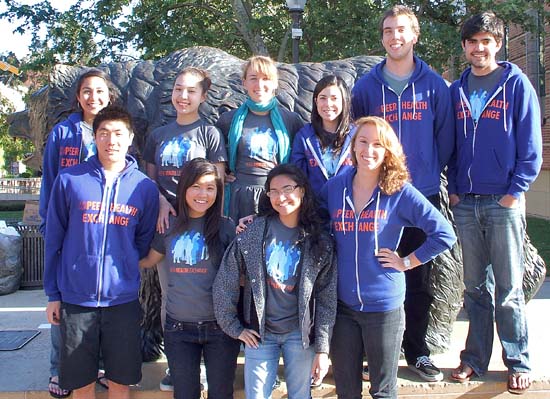In many high school health classes, students might be put off by their teachers’ teaching topics such as contraception and drug abuse.
And in the Los Angeles Unified School District, that’s if they even get a health education at all.
“The extent of some high schools’ health education is to just hang a poster of the food pyramid on the wall,” said Camille King, a fourth-year biology student, and one of the two co-coordinators of Peer Health Exchange at UCLA.
Peer Health Exchange, a nationwide nonprofit organization, utilizes the help of university students to provide the education these schools sorely lack. The organization trains college students to teach a series of workshops on topics such as sexual health, nutrition and substance abuse. This past fall, the organization branched out to Southern California, starting chapters at UCLA and USC.
While a complete health education program may seem fiscally expendable, it is a necessity when one considers that one in five sexually active teenagers becomes pregnant every year, King said.
“We see kids going into high school as freshmen and they are already mothers,” King said. “We definitely saw the need (for health education) there.”
Every Friday, volunteers from the Peer Health Organization at UCLA venture outside Westwood Village to nearby Los Angeles high schools to teach their workshops.
“(The purpose of Peer Health Exchange) is to empower high school kids with the knowledge of what healthy choices are,” said Tikvah Heller, a third-year world arts and cultures student and a health educator for the nutrition and physical activity workshop.
Though her major may not seem applicable to an organization that discusses health topics, Heller said she believes her performing arts background is useful in helping her instruct a class of high school students.
“We do a lot of workshops about managing classrooms and how to keep kids’ attention focused on you and how to engage them,” Heller said. “You definitely gain teaching skills.”
Peer Health Exchange’s workshops aim to engage high school students in an encouraging and informative manner. At a recent contraception workshop taught by the health educators at nearby University High School, students were shown how to properly put on a condom, and were then challenged with organizing the steps involved in putting one on.
Actual truth regarding drugs and sex is rare among freshmen, who treat the topics as a joke and then make bad decisions, said Austin Vye, a senior at University High School.
“We talk to teachers and principals at these high schools, and they tell us how they couldn’t get the point across because they’re adults telling them what to do,” King said.
The smaller difference in age allows students to relate to their instructors and absorb the information better, King said.
UCLA’s involvement in the organization also provides a positive way to influence high school students to go to college. At the end of a recent workshop at University High School, students asked their health educators questions regarding their college applications, their lowest grade in high school and even what color dresses they wore to their prom.
Now finishing its first year at UCLA, Peer Health Exchange is preparing for its second year in Los Angeles. Heller, who will be one of the two head co-coordinators for the organization at UCLA in the fall, said she wants to make volunteering for Peer Health Exchange a friendlier idea for North Campus students who may be deterred by the organization’s focus on health topics.
